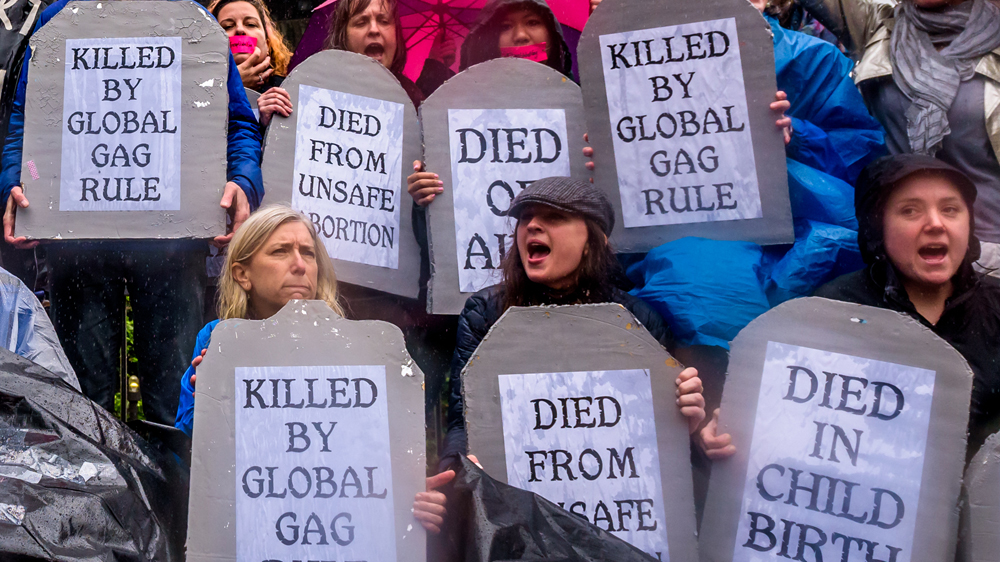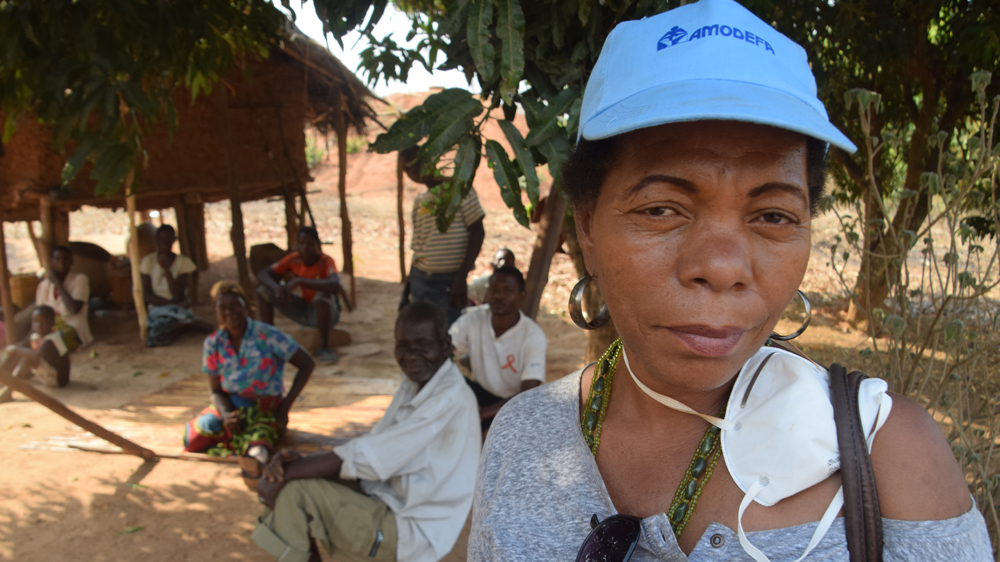‘Women and girls will die’: Trump’s foreign aid rule on abortion
An insight into the far-reaching consequences of Donald Trump’s ban on US funds going to foreign aid organisations that promote or perform abortions.

In the heat of a late September day in Mozambique, southern Africa, we started filming a meeting of young charity volunteers. They had poured heart and soul into an ambitious project aimed at combating HIV and spreading a message about contraception in the province of Gaza.
Then, out of the blue, and as our cameras rolled, came an unexpected announcement: the volunteers’ work was to end because of a new policy from the United States.
Keep reading
list of 4 itemsTen years after Chibok girls kidnapping: One woman’s struggle to move on
Poland lawmakers take steps towards liberalising abortion laws
Polish lawmakers debate reforming strict abortion laws
Under US President Donald Trump‘s “Protecting Life in Global Health Assistance” policy, any foreign aid organisation that wants US funds cannot “perform or actively promote abortion as a method of family planning in foreign countries”.
Sebastiao Muthisse from AMODEFA, the Mozambican Association for Family Development, outlined the dilemma the aid organisation faced. They were not prepared to sign Trump’s so-called ‘global gag rule’ forbidding mention of abortion, and, as a result, projects had to close.
For the youngsters it appeared to make no sense. Surely lack of advice on family planning would lead to unwanted pregnancies? Why should they be censored when it came to speaking about abortion?
HIV prevention
AMODEFA, a member association of the International Planned Parenthood Federation, has worked in Mozambique since 1989.
Now, the stance both organisations have taken on the Trump rule means they face losing millions of dollars in US aid, and for AMODEFA in Mozambique two-thirds of their total budget, a sum of $2m.
It’s led to hard decisions, particularly when it comes to critical work on HIV prevention.
In a suburb of the capital Maputo, we met Palmira Tembe. Members of Palmira’s family have died; five grandchildren are now dependent on her, along with her 13 year-old-son Nelson.
AMODEFA has received funds to help people like Palmira disclose to their families that they have HIV, and to support their care. Palmira told us that prior to the charity’s involvement she couldn’t tell her son Nelson why he was sick. Now both take HIV medicine together.
We will have generations that are sick without knowing what they have – they will run the risk of transmitting HIV to other people because they do not know their HIV status.
In a country where it’s estimated that up to 13 percent of people aged between 15 and 49 live with HIV, the support of organisations like AMODEFA can be a lifeline. But the work AMODEFA does with families like Palmira’s is under threat, due to their refusal to sign up to the Trump policy.
Project leader Dr Marcelo Kantu is concerned about the future.
“We will have generations that are sick without knowing what they have – they will run the risk of transmitting HIV to other people because they do not know their HIV status,” he told us.

Defying Trump
Visiting those supported by charity work in Mozambique, there was a recurring question: With the heavy price organisations could pay for defying the new US policy, why not forget about the abortion issue, sign up to the Trump rule, and keep American aid money?
Activists and charity workers told us it was not only about upholding a principle of choice, it was about free speech and a law introduced in Mozambique to save lives.
Mozambique liberalised its law on abortion in 2014, not least due to the high numbers of maternal deaths from illegal terminations. Since then, abortion is a legal option up until 12 weeks of pregnancy, and in cases of rape or incest during the first 16 weeks.
But there is Mozambique’s new law on the one hand, and the Trump policy on the other.
Under the US rule charities are unable to counsel on the availability of safe terminations if they want US funds. The US will also cease funding other health work if charities like AMODEFA use their own money – from non-US sources – to provide abortion services.
AMODEFA director Santos Simione told us the organisation was not prepared to censor the advice they give, because in the absence of information “people will go for unsafe abortion. Those people will die”.
Down a bumpy round on the outskirts of the capital, we visited an outreach event for Mozambique’s “Safe Abortion Day” and a clinic set up in a rural school to advise on contraception and the dangers of unsafe terminations.
The charity hosting this event, The International Centre for Reproductive Health (ICRH), was also facing a dilemma over whether to oppose the Trump rule and lose its US funding.
For ICRH country director Sally Griffin, reaching the decision that her organisation could not agree to US restrictions was about providing women and girls with a full range of support.
“In Mozambique safe abortion is now legal. We are trying to provide comprehensive services to young people so they can protect their health and realise their reproductive rights,” she told us.
Unforeseen consequences
As we travelled further in Mozambique, another recurring concern was that the loss of US funds could have unforeseen consequences on a range of support provided through aid programmes.
In the province of Gaza, we filmed at a large secondary school. Teenage pregnancies have fallen there since AMODEFA started educating on contraception. But the clinic in this school was due to close three days after we’d visited as a consequence of the charity’s opposition to US administration policy and loss of American funding.
Then, nearing the end of our journey, was another harrowing story.
Outside the capital, Maputo, we met Raquel Sambo and her 14-year-old daughter Rita. Rita was pregnant, due to give birth in November. AMODEFA had intervened to make sure Rita could continue her education and stay at school. But this project to support vulnerable women and girls could now be under threat.
AMODEFA also worked on a US flagship programme in the Province of Nampula aimed at combating the scourge of tuberculosis.
We accompanied one of the charity’s workers as she travelled to an isolated village to check on a patient AMODEFA was supporting and to test other residents for TB and provide them with medication.
Patient Albino Luis told us he was making a good recovery following the intervention of charity workers.
But AMODEFA’s work here was also threatened by the new US policy, leaving TB worker Maria Teresa de Fatima in despair. She told us that without continuing their treatment, patients would die; the effects of the Trump rule were, in her view, “against humanity. A catastrophe.”
The charity is now urgently looking at alternative ways to help those they support, seeking new partners and other avenues of funding.

Global picture
Over 130 NGOs have signed a letter condemning the Trump policy, including global names like Save the Children.
In Washington DC, in the US, we met an advocate from the international organisation WaterAid. This charity too opposes the Trump rule.
Women and girls will die as a result of reduced access to the basic services they need to survive and thrive.
Director of Policy and Advocacy at WaterAid America, Lisa Schechtman, said the charity feared for the future of sanitation projects they run. In her view, the consequences could be grave.
“Women and girls will die as a result of reduced access to the basic services they need to survive and thrive,” she said.
The NGO Population Action International (PAI) has researched the effects of a previous version of the aid and abortion policy put in place under Republican president George W Bush.
“If this [Trump] administration was truly concerned about protecting life, they wouldn’t have enacted this policy and they certainly wouldn’t have expanded it in the way that they did,” said PAI director of Advocacy Jonathan Rucks.
“We know from past iterations of this policy that maternal deaths increase, unsafe abortions increase. This is not going to help women thrive and it’s certainly not going to help children thrive in the absence of a mother.”
US response
Despite two months of asking, nobody from the US administration was available to be interviewed for our programme.
A USAID spokesperson instead told us in a statement, that the Trump policy did not reduce the amount of health assistance the US government makes available, and that “departments and agencies will reprogram to other organizations any funding they would have awarded to NGOs that do not agree to the conditions”.
On suggestions that the policy could lead to an increase in unsafe abortions and maternal deaths we were pointed to data being collected for a US State Department review. The findings have yet to be made public.
Meanwhile, in Mozambique, the TB worker we interviewed had her own message for Donald Trump:
“He should have a bit of compassion. I invite him to come here and see. Maybe if he sees it personally he will change his mind.”